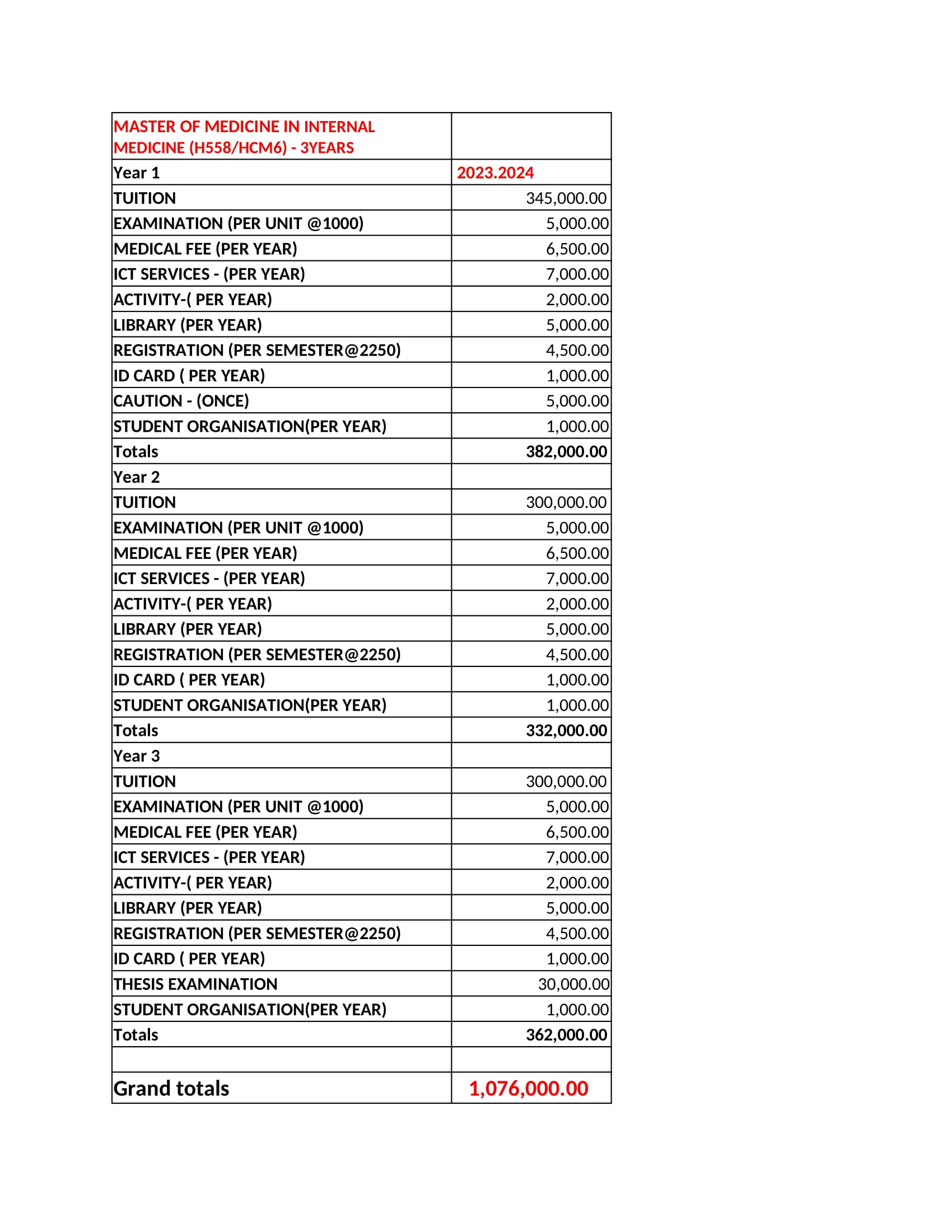Overview
OBJECTIVE OF THE PROGRAMME
The goal of the programme is to provide the learner with knowledge, skills and attitude to diagnose manage, prevent and perform relevant research in clinical medicine.
At the end of the programme, the learner should be able to:
- Evaluate the available information and synthesize appropriate solutions to internal medical conditions in patients;
- Apply diagnostic and therapeutic skills and attitudes to administer quality, ethical and effective care to patients in the clinical practice;
- Demonstrate leadership skills in clinical medicine discipline;
- Integrate acquired knowledge and skills to solve emerging health threats in clinical medicine;
- Design and undertake innovative and high-quality research to expand existing knowledge and/or improve professional practice in clinical medicine.
The philosophy of this programme is to provide quality university education and training in the field of internal medicine and to embody the aspirations of the Kenyans; and the global community through the creation, preservation, integration, transmission and utilization of knowledge.
Needs assessment and market analysis
The Ministry of Health and Kenya Association of Physicians have identified the challenges and gaps in the current training. Further, the Government of Kenya in its annual report of 2018, reported its determination to improve equity and access to quality essential healthcare services; and to ensure the health sector plays its role in the realization of Vision 2030, Public Service Reforms and the Millennium Development Goals. To achieve these goals, there’s a need to improve the quality of education and training to enforce competence in the health workforce.
Justification of the need for the programme
Inadequate numbers of skilled human resources have hurt efforts to expand access and improve the quality of health services. The increasing prevalence of both infectious and non-infectious diseases has further compounded the problem. Therefore, the country is in dire need of competent physicians capable to utilize evidence-based interventions, to prevent and reduce the new threats to health at the community level, and skilled in advocacy, to influence health policies.
In addition, to the clinical responsibilities, physicians are increasingly undertaking management responsibilities that require skills in leadership and management. Research skills are a prerequisite to tackling healthcare challenges through innovative research projects and implementation science. Furthermore, ethics and professionalism training are part of the requirement for quality healthcare. Hence this programme aims to fill the existing training gaps in internal medicine discipline and support the fulfilment and attainment of the set goals.
Contacts of Support Person
For any assistance contact the Secretary, Office of the Chair, Department of Clinical Medicine and Therapeutics
Telephone: 0204915041
E-mail: dept-medtherapeutics@uonbi.ac.ke
or pay us a visit at Kenyatta National Hospital Campus, University of Nairobi, Faculty of Health Sciences, Department of Clinical Medicine and Therapeutics
Structure
STRUCTURE
The programme shall be by course work, clinical rotation and dissertation.
- The programme will run three years full time course and maximum of 6 years.
- All courses are compulsory
- The degree programme shall consist of two parts
- Part one will be undertaken during the first academic year shall consists of principles of internal medicine and junior clerkship
- Part two will be undertaken during the second and third year and shall consist of elective term, external rotation, dissertation and senior clerkship
- The candidate is expected to complete the logbook of activities and experiences during the training
- The candidate may be discontinued under the following circumstances
- Medical grounds on recommendation by the school and approved by senate exceeds the prescribed maximum duration of the programme or poor progress without a valid reason or disciplinary and integrity issue.
MODE OF DELIVERY
Formal lectures, tutorials and seminars, clinical demonstrations, clinical teaching including bedside teaching, ward rounds, ambulatory care teaching in outpatient clinics, and self-directed learning.
Open distance and e-learning mode
This will be offered using a multi-media approach that includes self-instructional print and electronic study materials.
The blended combines online learning with synchronous, asynchronous and face-to-face methods.
Admission Requirements
ADMISSION REQUIREMENTS
- The common regulations for admission to postgraduate degree courses of the University of Nairobi, will apply.
- The applicant eligible for admission into the programme shall fulfill the following additional conditions:
- Be in possession of a medical degree obtained in an institution recognized by the University of Nairobi Senate
- Registrable in Kenya with the Medical Practitioners and Dentists Board (MPDB)
- Evidence of proficiency in English recognized by the University of Nairobi Senate example. TOEFEL
- Certificate of good conduct from the MPDB
- Obtain a valid professional indemnity cover during full period of training
Schedule of Intake
Intakes are in September every calendar year. Registration and admission for qualified applicants commence in August. For more information on Registration & Admission please click here
APPLICATION INFORMATION
Contacts of Support Person
For any assistance contact the Secretary, Office of the Chair, Department of Clinical Medicine and Therapeutics
Telephone: 0204915041
E-mail: dept-medtherapeutics@uonbi.ac.ke
or pay us a visit at Kenyatta National Hospital Campus, University of Nairobi, Faculty of Health Sciences, Department of Clinical Medicine and Therapeutics
Careers
CAREERS & ATTACHMENT OPPORTUNITIES
Apply knowledge and skills in the management of internal medical conditions.
Demonstrate competency in the diagnostic and therapeutic skills for ethical and effective patient care through application of relevant information to clinical practice.
Apply and deliver highest quality care and leadership with integrity, honesty and compassion while exhibiting appropriate personal and interpersonal professional behavior.
To Critically analyze literature and utilize it to manage patients implement a strategy for self-learning, and facilitate learning of others
To design and perform high-quality priority research in clinical medicine
NOTABLE ALUMNI
1. Dr. Dan K. Gikonyo - Chief Cardiologist and Founder, The Karen Hospital
2. Professor Erastus Amayo- Consultant Neurological Surgeon
Fees and Funding

